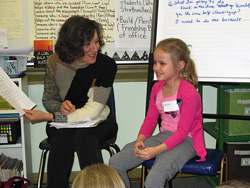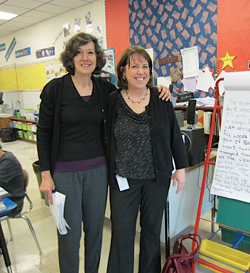by Regie Routman
None of us perform or learn well in a culture where fear trumps joy and mistrust prevents risk taking. Yet, strict accountability measures for teachers and principals are making our educational climate one of increasing apprehension and distrust. Fueled by a belief that teachers aren’t competent enough, rigorous and scientific evaluation systems are being touted as the route to more effective teaching and higher student achievement. Teachers are increasingly being evaluated under tougher, more complicated guidelines with an overreliance on test data to measure student growth. While principals may gain useful data with the new systems, the cost is high. The additional evaluation pressures on teachers and principals are leading to increased job loads and unhealthy, intimidating school cultures that are driving competent educators away from the profession.
 Celebrating a student’s writing on
Celebrating a student’s writing on
making the world a better place  During an instructional walk, celebrating
During an instructional walk, celebrating
fifth-grade teacher Laurie Espenel as an
excellent teacher of writing Let’s imagine another scenario and mind set. Instead of beginning with required evaluations, official observations, and worry about meeting the new Common Core State Standards, we begin with celebration and what’s going well—noticing and commenting on the principal’s, teacher’s, and student’s strengths. Starting with genuine celebration is a necessity for creating a school culture where raising and sustaining student achievement is possible. Teachers, principals, and students need to feel they belong to a collaborative community where their unique talents are recognized and appreciated. In my forty-five years of teaching, coaching, and leading, I have never seen increased and sustained literacy achievement without a collaborative, knowledgeable, and trusting school–wide culture.
What Real Celebration Is
Noticing and celebrating what students and teachers are doing well is not a frill or mere paying of compliments. It is honestly and specifically acknowledging a positive behavior, action, or learning activity. It requires re-visioning what we see, say, and do when we walk into teachers’ classrooms. It is how we must begin every professional development encounter and meeting, by celebrating something—a task, part of a lesson, work sample—that a teacher or student has tried, accomplished, risked, or succeeded at. It is only when we feel valued that we are open to suggestions and can willingly consider necessary changes. Starting with celebration makes it possible to build a climate of trust where the principal is welcome in the classroom every day, teachers share collective responsibility for all the school’s students, and learning from and with each other is part of the school’s culture.
I apply celebration to all the work I do in schools, and it is the first step for raising expectations for what’s possible. For the past fifteen years, I have been working in diverse schools and classrooms in the United States and Canada. Using a weeklong residency model where I gradually release instructional responsibility to teachers, the principal, and the students, each morning teachers at and across grade levels are released to observe me teach reading and/or writing to the same class of primary students and to a separate class of intermediate students.
I developed this professional development model when I realized teachers and administrators needed to see “What does it look like and sound like to teach reading and writing effectively?” and “What does it look like and sound like to celebrate a teacher’s efforts and a struggling child’s learning?” Teachers and the principal observe the impact of genuinely celebrating each child as a writer and reader and each teacher as a professional. After each lesson, we meet as a whole group to debrief, and our professional literacy conversations extend throughout the day and week.

Still smiling after a long day: Teachers at our February 2013 writing residency in Winnipeg, Canada
Instructional Walks
A crucial part of the residency work is ensuring that the principal is a positive and strong instructional leader who knows literacy. Therefore, every afternoon, I demonstrate and coach the principal in what I call instructional walks. I enter each classroom with a mindset of what the teacher is doing well, whether it be some small aspect of the classroom environment, student engagement, level of questioning, or purposefulness of the work. I model the language and demeanor of what to say to the teacher and how to say it, what to look for in a highly functioning reading-writing classroom, and how to take specific but nonjudgmental notes that comment primarily on what the teacher is doing well while also noting particular concerns and school wide patterns of strengths and needs. Starting with what’s going well building-wide, we present our school wide observations, without blame, to the whole staff and jointly decide—considering all available sources of data—what our school wide focus needs to be.
The tone and purpose of these instructional walks is paramount. It is not a “gotcha” situation. Many teachers who are used to a walkthrough process that feels judgmental have told me how devalued they have previously felt from negative feedback or the lack of feedback and/or fearful about how the observational information might be used.
Our first purpose in the instructional walks is to build on teachers’ expertise and gain their trust; I find something to celebrate and honestly comment on it. It is likely that if students are doing something well, it is because of the teacher’s behaviors and actions. I never leave the classroom without speaking directly to the teacher about something positive I have noticed. There are several reasons for that decision. I believe it is disrespectful to come into a teacher’s classroom, take notes, and leave without giving positive feedback. Also, as with students, every time I am in a classroom is an opportunity to teach. Thirdly, I know from experience that giving positive but honest feedback builds a trust and gives dignity, energy, and encouragement to teachers. Someone has noticed what the particular teacher is doing well, and that genuine respect can be transforming.
Transformative Feedback
A few years ago, on an instructional walk, I celebrated a teacher for her demonstration writing, which was highly visible on a chart stand in her classroom. Clearly, she had been attending to the morning’s demonstration on writing for an authentic audience and purpose and was following our recommendation of “try it, apply it.” Her writing, where
she thought aloud in front of her students as she wrote, was full of vivid language, cross-outs, and additions that showed rethinking and revisions, and a compelling lead and satisfying conclusion. Her first response when I commented specifically on all she had done well was, “This isn’t very good.” But once convinced that I was sincere, she burst into a big grin. Sensing I had her confidence, I asked, “Would you like any suggestions?” She was hungry to know how she could improve her writing and the students’, and we engaged in a lively conversation.
In a follow-up residency a year after that instructional walk, the teacher confirmed that the positive, specific feedback she received that day was a life-changing turning point for her. Not only did she develop into an excellent teacher of writing who is always striving to get better, she became a leader in the school change process. In fact, she moved from a teacher who had been viewed by some colleagues and administrators as difficult and a resister to one who is now seen as inspirational. She has become a positive team player who reaches out to colleagues to share her knowledge and to encourage and support them. She is a valued and trusted member of the learning community, and her transformation has impacted the entire staff.
Additionally, because of her close bond with her principal, which began through frequent instructional walks and the corresponding celebrations, she now welcomes her principal into her classroom as a trusted colleague and coach. Formal evaluation visits are separate, and because of the shared trust that has developed between the teacher and the principal, these evaluations are not seen as threatening or devaluing but, rather, as helpful.
Getting the Full Measure
You cannot get the full measure of a teacher through lesson plans, extensive checklists and rubrics, and time-consuming evaluations. In fact, such evaluation can be counterproductive. In focusing on checking off all the bits and pieces, you lose the essence of the individual you are observing. The whole truly is larger than the sum of its parts. The effectiveness of a teacher, like the effectiveness of an artist, musician, or any other professional, cannot be quantified through a formula or composite of complex, evaluative measures. Whatever evaluation process we eventually wind up with, it must be respectful to the teacher, principal, and student and worthy of the time and effort that process takes. And it must begin with celebration!
 Regie Routman is a national teacher and author whose current work involves weeklong school residencies where she demonstrates effective literacy teaching in diverse classrooms. Her latest book is Literacy and Learning Lessons from a Longtime Teacher (International Reading Association, 2012). Visit her website at www.regieroutman.org for more information on her PD offerings, books and resources, and blog. She can be reached at regieroutman@gmail.com.
Regie Routman is a national teacher and author whose current work involves weeklong school residencies where she demonstrates effective literacy teaching in diverse classrooms. Her latest book is Literacy and Learning Lessons from a Longtime Teacher (International Reading Association, 2012). Visit her website at www.regieroutman.org for more information on her PD offerings, books and resources, and blog. She can be reached at regieroutman@gmail.com.
This article was published in the June/July 2013 issue
of Reading Today. IRA members can read the interactive digital version of the magazine here. Nonmembers: join today!
